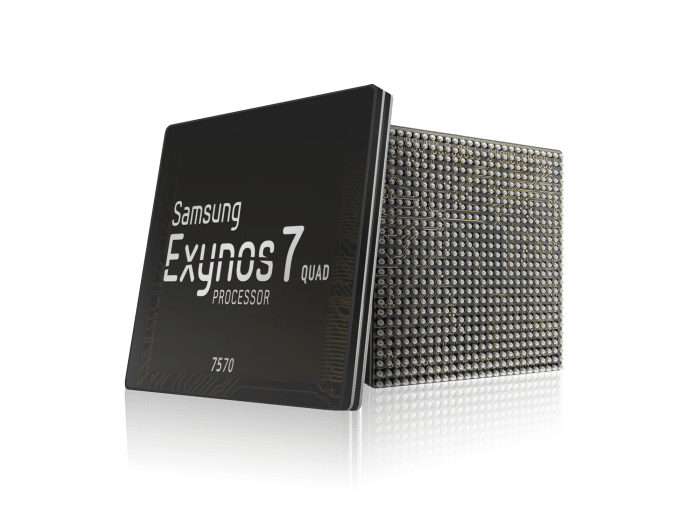Exynos 7570 Processor Overview
Samsung’s Exynos 7570 processor is a new addition to their lineup, designed to power budget-friendly smartphones and wearables. This processor boasts a 14nm manufacturing process, bringing notable improvements in power efficiency and performance compared to its predecessors.
Core Architecture and Clock Speed
The Exynos 7570 is built on a 14nm FinFET process, which allows for smaller transistors and higher density, leading to improved power efficiency and performance. It features a quad-core ARM Cortex-A53 CPU, clocked at up to 1.5 GHz, ensuring smooth operation for everyday tasks. This architecture balances performance and power consumption, making it ideal for devices that prioritize battery life.
14nm Manufacturing Process
The 14nm FinFET manufacturing process, used in the Exynos 7570, represents a significant leap forward in semiconductor technology. Compared to previous generations, this process allows for:
- Reduced power consumption: The smaller transistors consume less power, extending battery life. This is particularly important for devices like smartphones and wearables, which rely heavily on battery performance.
- Improved performance: Smaller transistors enable higher clock speeds, leading to faster processing and smoother operation.
- Increased density: More transistors can be packed into a smaller area, resulting in smaller and more compact devices.
Target Applications
The Exynos 7570 is primarily designed for budget-friendly smartphones and wearables. Its combination of power efficiency and performance makes it suitable for:
- Entry-level smartphones: These devices often prioritize affordability, and the Exynos 7570 provides a balance between cost and performance.
- Smartwatches and fitness trackers: Wearables need to be power-efficient to ensure long battery life, and the Exynos 7570’s low power consumption makes it ideal for these devices.
- Other connected devices: The processor can also be used in other connected devices, such as smart home appliances and IoT gadgets.
Performance and Power Efficiency
The Exynos 7570 processor is designed to offer a balance between performance and power efficiency, catering to the needs of budget-conscious users who still desire a smooth and responsive experience. To understand its capabilities, we’ll compare its performance with other processors in its class and delve into its power consumption characteristics.
Performance Benchmarks
To assess the Exynos 7570’s performance, we can look at benchmark scores, which provide a standardized way to compare different processors. While specific scores may vary depending on the test and device, we can analyze general trends to understand its relative strengths and weaknesses.
- CPU Performance: The Exynos 7570 features a quad-core ARM Cortex-A53 processor, which is known for its energy efficiency. While it might not be the fastest processor available, it should be sufficient for everyday tasks like browsing, social media, and light gaming. Compared to other processors in its class, it offers a decent balance between performance and power consumption.
- GPU Performance: The Exynos 7570 integrates a Mali-T720 GPU, which is responsible for graphics processing. This GPU is capable of handling basic graphics demands, making it suitable for casual gaming and multimedia playback. However, for more demanding games or graphics-intensive tasks, its performance might be limited.
Power Consumption and Battery Life
The Exynos 7570 is designed with power efficiency in mind, aiming to extend battery life for devices utilizing it. This is crucial for budget-friendly smartphones, as they often have smaller batteries compared to flagship models.
- Battery Life: The processor’s efficient design, combined with optimized software, contributes to longer battery life compared to processors with higher performance but less focus on energy saving. This is beneficial for users who prioritize battery longevity over raw processing power.
- Thermal Management: The Exynos 7570’s power efficiency also helps in managing heat generation. By minimizing power consumption, it reduces the thermal load on the device, contributing to a cooler operating temperature and preventing overheating issues. This is important for user comfort and device longevity.
Impact on User Experience
The performance and power efficiency of the Exynos 7570 directly impact the user experience.
- Smooth Performance: The processor’s performance is adequate for everyday tasks, ensuring a smooth and responsive experience for basic applications and activities. This translates to a pleasant user experience for most users.
- Longer Battery Life: The processor’s focus on power efficiency extends battery life, allowing users to enjoy their devices for longer periods without needing to constantly recharge. This is especially beneficial for users who are on the go and need their devices to last throughout the day.
Impact on the Mobile Market: Samsung Starts Mass Production Of New 14nm Exynos 7570 Processor
The Exynos 7570 processor, with its focus on efficiency and affordability, is poised to have a significant impact on the mobile market, particularly in the budget-friendly smartphone segment. This processor could usher in a new era of accessible technology, bringing advanced features and capabilities to a wider audience.
Influence on Budget Smartphone Pricing and Availability
The Exynos 7570’s efficiency and cost-effectiveness could lead to a surge in the availability of budget-friendly smartphones. This processor could empower manufacturers to create devices with competitive features at lower price points, making advanced technology accessible to a wider audience. The availability of such devices could lead to increased competition in the budget segment, driving prices down further and offering consumers a wider range of choices.
Potential for Innovation in the Wearables Market
The Exynos 7570’s low power consumption and compact size make it an ideal candidate for powering wearables. Its efficiency allows for longer battery life, crucial for devices that are constantly in use. This processor could enable manufacturers to create more sophisticated wearables with advanced features like health monitoring, fitness tracking, and communication capabilities. The potential for innovation in the wearables market with the Exynos 7570 is vast, paving the way for a new generation of smart and connected devices.
Comparison with Competitors, Samsung starts mass production of new 14nm exynos 7570 processor
The Exynos 7570 competes with other chipsets in the budget segment, including Qualcomm’s Snapdragon 400 series and MediaTek’s Helio A series. While a direct comparison depends on specific models and configurations, the Exynos 7570 generally offers a balance of performance and power efficiency. Its 14nm fabrication process allows for better power management compared to older 28nm processors, making it a compelling choice for budget-friendly devices.
The Exynos 7570’s efficiency could lead to a new wave of affordable smartphones with longer battery life and improved performance.
Future Implications
The Exynos 7570 marks a significant step in Samsung’s mobile chip strategy, but it’s just the beginning. The company is likely to continue pushing the boundaries of performance and efficiency with future Exynos processors, leveraging advancements in semiconductor technology and adapting to the evolving demands of mobile devices.
Impact of Emerging Technologies
The rise of 5G and AI is expected to have a profound impact on the development of future Exynos processors. 5G’s high bandwidth and low latency will demand processors capable of handling massive data transfers and real-time processing, while AI applications will require powerful neural processing units (NPUs) to deliver smooth and intelligent experiences.
- Enhanced 5G Support: Future Exynos processors are likely to feature integrated 5G modems, offering seamless and fast connectivity for next-generation mobile devices. These modems will be optimized for high-speed data transfer and low latency, enabling users to enjoy faster downloads, smoother streaming, and lag-free gaming.
- Dedicated AI Processing: Samsung is expected to invest heavily in developing dedicated NPUs for future Exynos processors. These NPUs will accelerate AI-related tasks such as image recognition, natural language processing, and on-device machine learning, enhancing user experience and improving device performance.
Samsung starts mass production of new 14nm exynos 7570 processor – The Exynos 7570 is a testament to Samsung’s commitment to providing powerful and efficient processors for a variety of devices. This chip is poised to make a significant impact on the mobile market, offering users a compelling combination of affordability and performance. As technology continues to evolve, we can expect even more innovative processors from Samsung in the future.
Samsung’s ramping up production of their new 14nm Exynos 7570 processor, a move that could be a game-changer for budget-friendly smartphones. Meanwhile, rumors are swirling about the next iPhone, with leaked images suggesting the smaller model could feature optical image stabilization, a feature previously reserved for the larger iPhone Pro models. This could mean sharper photos even in low-light conditions, and a potential edge for Apple in the ever-competitive smartphone market.
As Samsung pushes forward with their new processor, it’s clear that the battle for smartphone supremacy is heating up.
 Standi Techno News
Standi Techno News

